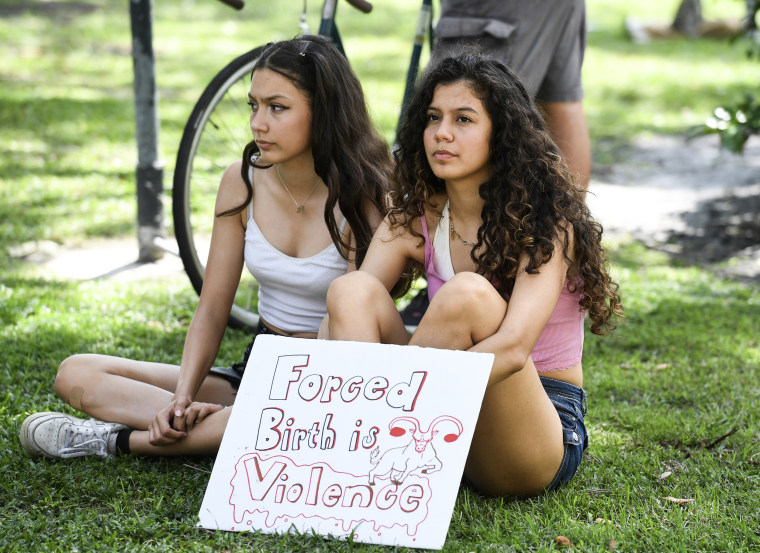Latinas remain the largest group of women of color in the nation impacted by current or likely state abortion bans more than a year after the Supreme Court struck down Roe v. Wade last summer.
A new analysis from the National Partnership for Women & Families and the National Latina Institute for Reproductive Justice, first shared with NBC News, found that close to 6.7 million Latinas (43% of all Latinas ages 15-49) live in 26 states that have banned or are likely to ban abortions.
That's 200,000 more Latinas than last year when the organizations estimated that almost 6.5 million Latinas were threatened by state abortion bans.
Three-quarters of the Latinas who live in states with abortion bans or restrictions are concentrated in Texas, Florida and Arizona, according to the report. They make up almost one-third of all Latinas of reproductive age in the nation.
Texas, where abortions are banned, is home to 2.9 million Latinas of reproductive age. Florida and Arizona, where abortions are restricted, are home to 1.4 million and 585,600 Latinas of reproductive age, respectively.
More providers, centers and clinics that have long served as entry points for women to receive affordable reproductive health care services such as birth control and maternity care have been closing down in states riddled with abortion bans and restrictions, Lupe Rodríguez, executive director of the National Latina Institute for Reproductive Justice, told NBC News.
“The conditions on the ground and politically have actually gotten worse in many states,” she said. "There hasn’t really been any change in terms of shifting the the political and legislative landscape to make it so that anything might have gotten better.”
Twenty-six states, most of them in the South and the Midwest, have banned or significantly restricted abortions, according to the Guttmacher Institute, a research and policy nongovernmental organization tracking reproductive rights. Abortions remain protected in some capacity in 24 states.
More than 3.1 million Latinas affected by these current and future abortion bans are already mothers, according to the report. About 27% of them have children under age 3.
Denying women abortion care may have a negative impact on their children's economic security and development, a study found.
Another study found that women who had been denied abortion access experienced worse economic and mental health outcomes than women who had received care.
The growing lack of reproductive health and abortion access can increasingly cause mothers and their families to face poorer health outcomes, according to Rodríguez, as more people are forced to travel across multiple state lines to access care in a timely manner. This is a difficult task, she added, considering the costs of travel and child care for their children. There are also added risks for those who lack legal immigration status and may face the risk of deportation if they travel more than 100 miles into the interior where Border Patrol checkpoints are set up.
'Hit on every front'
More than 3 million Latinas in states where abortion is becoming increasing inaccessible were “economically insecure” or living in families below 200% of the federal poverty line, according to the report.
More than 1.4 million Latinas in the 26 states surveyed work in the service industry. Such jobs often have low wages and lack access to health insurance and paid leave, among other benefits, complicating their ability to afford and access abortions and other forms of reproductive health care.
"The report also speaks to how economic justice is so connected to reproductive justice,” said Candace Gibson, director of government relations at the National Latina Institute for Reproductive Justice, and co-author of the report. “We can’t have one without the other.”
These restrictions on abortion and reproductive health access are happening as many Latino children and their families were hit harder by the expiration of a temporary expansion of the child tax credit. That program provided parents nationwide a small financial reprieve from the Covid pandemic’s economic turbulence, as well as the end of federal child care funding, Katherine Gallagher Robbins, another report co-author, pointed out.
"Right now, families, and in particular Latinx families, are just being hit on every front, when it comes to that nexus of reproductive and economic justice," she said.
The harms of abortion bans are further exacerbated by misinformation and disinformation aimed at Hispanic communities, often spreading falsehoods about the legality of abortion and the health implications of the procedure.
While that's "a bleak picture for a lot of families," Rodríguez emphasized the work of abortion funds and other networks continuing to help people with abortion needs despite the challenges.
Changing the law to restore abortion access "is obviously essential," said report co-author Shaina Goodman. "But it is also about addressing long-standing systemic barriers to equality and to equity, everything from access to affordable health care to having culturally competent providers."

